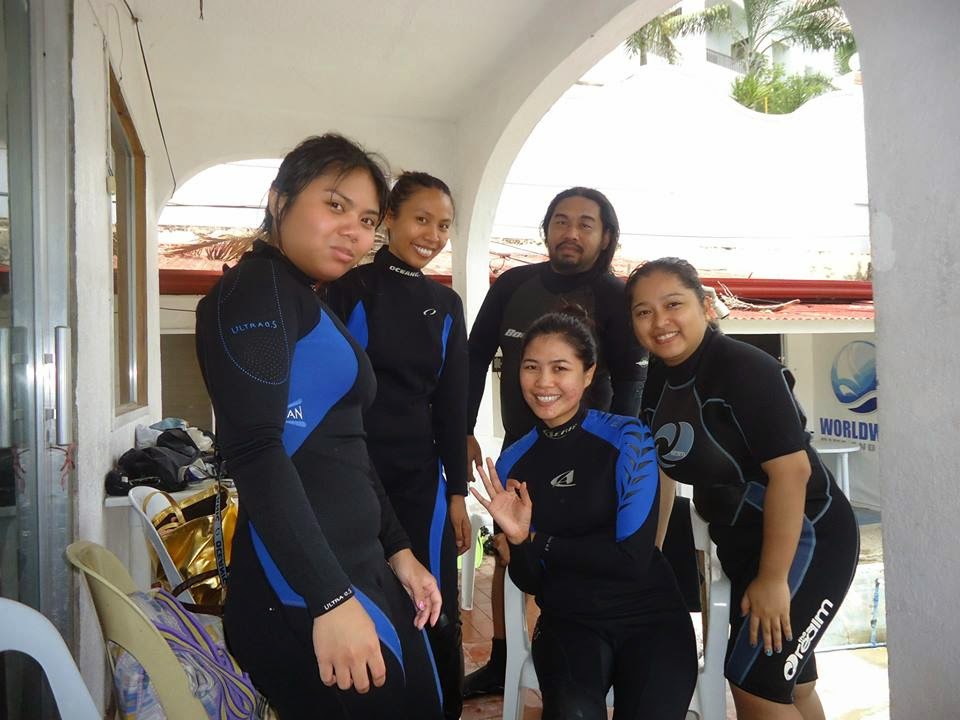It never came to
my mind that I would be able to do scuba diving. One of the reasons is I have a
water trauma. When I was in grade school, I fell in a huge dam and almost got
drowned. I was thinking diving is really not for me. It was not until my friend
who’s into diving encouraged me to try it. After a lot of encouragement and
procrastination, I've gathered all my courage to do it.
The schedule was
set. We decided to do it on Easter Sunday. I was shaking in anticipation. We started at around 9 am. During the briefing, our
diving instructor discussed about the rules. I was so eager to listen and make
sure I remember all of it. Oh yeah, I got to remember all of it! Our diving
instructor discussed the basic rules as we are just doing the Discover Scuba
Diving program.
First rule: Don’t hold your breath.
It’s not
normal that you use your mouth for breathing, but you have to practice and have
to be comfortable breathing using your mouth just like a normal breathing.
Second rule: Breath slowly.
You have to
follow a pattern of breathing. Not too slow and not too fast.
Third rule: Ascend
slowly.
It is very
important to go up slowly when diving. Here’s the reason why. In scuba diving,
you’re using a compressed air and your body takes extra oxygen and nitrogen.
The body uses the oxygen and the nitrogen dissolves in the blood. When you go
up, the pressure decreases. If you go up too quickly, the nitrogen won’t have
time to clear from your blood and it would create bubbles in your blood which
would damage blood vessels. That's scary! :-)
We were also
taught about the hand signals, and how to equalize the ear pressure. The
equipment where explained. I was so focus on the regulator as this would be the
source of my life down under. After hearing all the rules, I was a bit scared but decided. There’s no
turning back.
We then changed
to our diving gear. We have to practice the skills which should be
performed in a swimming pool. We practiced
the proper breathing, mask clearing, and regulator clearing. Our instructor was
so patient in teaching us until we mastered it.
After we
mastered all of the skills, it’s time to go to the open water. Surprisingly,
I’m not scared anymore. I've gained so much confidence after learning
all of the skills. We floated through the sea then I just felt that we’re in
the deep already. As we descended, I experienced an ear pain. My
friend signaled to do ear equalization. I did ear equalization many
times as we go deeper and deeper until it’s gone. When we reached the deep, I
saw a man made heart shaped stone with a word “I love you” etched on it. I was
then amazed by the fishes with different colors swimming over me.
As we swam
further, I saw corals moved in harmony with the sea. I saw baby fishes taking
shelter in a reddish brown coral, a red and brown starfishes, fishes that swam
vertically in pairs, and sea urchins with grand black thorns. It was so
beautiful and amazing seeing these creatures in their natural habitat. I was so
relaxed and found myself enjoying it.
We reached 31
feet deep. After 40 minutes of swimming and taking pictures, my
instructor signaled that we have to go up. I didn't realize
that we were under the sea for that long. Slowly we ascended. When we
reached the surface, I had a big, wide smile and good feeling
of fulfillment. Yes, I conquered it! I did it!
With this
experience, I realized that there's nothing to be scared of in scuba diving at
all. As long as you follow your instructor's instruction and master the skills then you're good to go. It also become clearer to me how important it is to take care
of our seas. Oceans are our life support system. If we keep on destroying the
corals, putting our trash to the sea, overfishing, there will be less or
no fishes and other amazing creatures left for the future generation.
I would like to
thank Trek and Dive for this one of a kind experience. If
you want to experience scuba diving, you may contact them through their
Facebook page.







